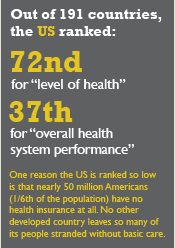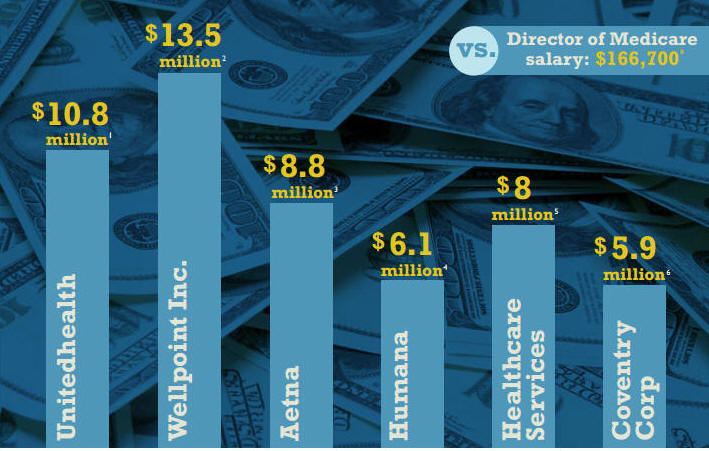Universal Caring
    
The Affordable Care Act (Obamacare) is rolling out better in those states
that created their own portals for insurance shoppers, rather than leaving it to
the Federal Government to do it for them. Progressives are calling this a win,
as are some otherwise uninsurable customers. The big winners? The existing
insurance providers and their stockholders, of course.
By RAR
My family's experience with the health
care industry in the United States has left me wondering where people who love
their existing coverage and their current provider must live. Or more to the
point, why am I always living in the wrong place?
One wouldn't think that quality medical care would be difficult to find in
the San Francisco Bay Area, but it is and the reason that it is pretty much
encapsulates the problem with making provision of health care a profit-making
enterprise.
The Bay Area is a sophisticated place, filled with technical specialists of
all kinds, and there is a stratified professional structure in place that
mirrors the area's class structure. That is all what it is because of the nature
of the San Francisco/San Jose megalopolis, which is big on high-end expertise
across every discipline. For many executives in the corporate world, San
Francisco remains a reward for success achieved in minor league locations. On
the flip side, the area isn't an easy place to start a career unless you have
software design skills, or an MBA from Wharton.
This super-stratification in job classifications has been embraced by every
for-profit corporation, in the San Francisco Bay Area and probably everywhere
else, because it allows all revenues to be pushed into salaries and bonuses for
top people, and into payouts to stockholders and investors. The very smallness
of what remains for distribution to the low-level personnel within each
organization serves as an incentive for each to find some way for themselves to
break from the pack and rise above, into those higher classes of people; a
winning class, maybe not the winningest.
(continued below)
Is Everything Subject to Profit Taking?
This seems obviously to be an issue of ethics. Capitalism's lust for
financial reward has a place that could be good for an economy and its people,
but surely its reach must be limited to the realm of products produced for
purchase through discretionary spending. Surely we are not people who seek to
profit from provision of basic services to others, are we?
Obviously that is precisely the type of people who the minority owners of
U.S. capitalism are, so why is it allowed to continue to the detriment of the
majority population?
Imagine a world where costs are kept low for food, shelter, utilities and
health care. It is shortages in these areas of basic requirements that drive
most of the world's conflict, so why do we remain in the grip of an inherently
hostile approach to social responsibility. Think of what could be accomplished
by a world in which corporate executives in those key industries were denied
their enormous salaries, presently out of alignment with any previous period of
historical debacle. The royal "We" of today are the greediest bastards of all
time, even when working in the non-profit sector inhabited by the likes of
Kaiser Permanente and their kind.
The graphic below was lifted from Steven Hill (www.Steven-Hill.com),
a political writer whose latest books include Europes Promise: Why the European
Way is the Best Hope in an Insecure Age (www.EuropesPromise.org) and 10
Steps to Repair American Democracy (www.10Steps.net).
What it shows is the obscene rewards received by the CEOs of the major
providers, whose futures have been locked into place by the Affordable Care Act,
where a single-payer system would have put them on the streets. Hill's graphic
compares their obscene incomes versus the salary of the Director of Medicare.
The ultra-elitists, depicted in the main article on this page, would argue that
you need to pay that kind of salary to attract and retain the kind of talent it
takes to run corporations of these magnitudes.

In truth, they don't run these big corporations well at all, if the metric is
delivery of quality health care at an affordable price. The World Health
Organization ranks the U.S. as 72nd in level of health compared against 191
countries. They ranked the U.S. health care system 37th overall for health
system performance.
In what other field does the United States public accept such poor
performance? And why would we accept it in our health care delivery system, of
all places?
Steven Hill's articles and op-eds have appeared in the New
York Times, Washington Post, Wall Street Journal, International Herald Tribune,
Financial Times, Guardian, Los Angeles Times, New York Daily News, The Nation,
Washington Monthly, Ms., Salon, International Politik (Germany), Hürriyet Daily
News (Turkey), Courrier Japon, India Times, Egypt Daily News, and other leading
publications. He is a cofounder of FairVote and former political reform director
at the New America Foundation.

(continued from above)
My personal experience with doctors has been mercifully little. I have tended
to like my primary care physicians, not because they were any good at being
doctors - I once jokingly asked to see the credentials of one of them - but
because they were funny people. Funny worked fine for me, though there are
probably downsides to seeking medical care from a comedian. They never stayed
around long, just doing time as rotating nameplates on the medical partnership
to which they belonged.
My wife's experience has been far more involved. She grew up with all sorts
of anxiety disorders and at a time when physicians were treating everything that
came across their desk as a problem with chemical imbalance, which could only be
addressed with a pharmaceutical solution, an anti-depressant in some form. This
was the Prozac Nation period of social development in the U.S. and
elsewhere.
Decades now having passed, with the benefits of retrospection now usefully
accessible, it seems clear that this wave of anxiety that swept the nation,
followed by a wave of pharmaceutical applications, was a sign that something
was going horribly wrong in the lives of many, many people. It had
everything to do with the convergence of that professional-social dynamic
described above, and the emergence of a pharmaceutical vampire industry that
would push chemical substance abuse to everybody who had become hyper-sensitized
and nervous, even as they became required to enumerate their drugs' harmful side
effects. This chemical lobotomy of the masses, so we could continue to drag
ourselves through our paces within this zombie charade, became the accepted
norm. This is, in fact, the health care industry that some of us are fighting so
hard to keep. (See David Icke's "sheeple", discussed in this
article on media and communications.)
When my family's coverage changed to Kaiser Permanente, we got the other
non-pharmaceutical side of the fuzzy stick, which was poor care at the primary
caregiver level. We would soon find out that Kaiser Permanente is organized on
the same model as those Silicon Valley corporations that sell goods aimed toward
the discretionary spending segment of the economy.
We chose our own doctor from the list of one physician who was taking new
patients. She turned out to be something very near to an idiot, and I say that
without prejudice. Like my previous doctors, she was funny, too, though not so
much intentionally. Every time you asked her a question, she would make this
motion of something passing right over her head. What she seemed able to do was
type information into the Kaiser computer system, which is quite impressive
regarding data capture, but extraordinarily useless regarding information
retrieval. I suspect the system supports that function, but the low level staff
at Kaiser just doesn't seem to use it.
The other thing our Kaiser primary caregiver could do was order tests, even
unnecessary tests. Kaiser is big on putting healthy patients through
examinations to determine if they are going to get sick in the future. That is,
actually, as stupid as it sounds because everyone is going to get sick in the
future. Everybody eventually dies of either cancer or heart disease.
Kaiser's focus is on your rectum. They want everyone to get a colonoscopy
exam, whether one is having any issues in that area or not. The purported reason
for doing this is that certain tumors can be caught early and dealt with before
they do any greater harm.
Ah, but greater harm was there for the doing, because when my wife showed up
to have this unnecessary procedure performed she was turned over to another
low-ranking, poorly qualified doctor, who does nothing but colonoscopy exams on
people, most of whom don't need them.
I remember sitting in the waiting room, waiting for my wife to come out of
this procedure, and she didn't show up for the longest time, though there was
this constant stream of ashen-faced old people wheel-chaired out of the
performance area. I was finally summoned to sit with my wife, still in recovery
from a procedure that had not gone well. Though she complained of pain, the
doctor was rough with his colonoscopy procedure, finally giving up and
announcing that she probably had Crone's disease.
Mind you, she felt totally well and had no symptoms of anything when she went
in, going through with the procedure only because she had been convinced that as
a responsible mother, and an adult, it was the right thing to do.
A couple weeks later, her intestines seemed to stop working. She went to
Kaiser, who didn't have a doctor who would see her, but was told by a nurse that
she should take a laxative. Four days later, as things got progressively worse,
another Kaiser nurse told her to double the amount of laxative she was taking,
though on the bottle there were strict warnings against such dosing.
On Saturday of that week, she began to have terrible abdominal pain, and it
was finally determined that we needed to get her to the emergency room. She was
scared but didn't want to call an ambulance, so we made a near-catastrophic
error in judgment and drove her to the Kaiser Vallejo emergency room.
The Kaiser ER staff checked her in and told her to have a seat in a waiting
room that was filled with people, none of whom seemed to be getting any service
at all. There was a security guard with a station there in the waiting room,
outside of the ER check-in desk, which seemed to be behind a bullet-proof glass
partition.
My only previous experience with an emergency room visit was at another
hospital where once I came in thinking I was having a heart attack and got
immediate care. It wasn't a heart attack, just debilitating panic. They sent me
home with instructions to drink a glass of red wine.
We waited in the Kaiser ER waiting room for six hours, during which my wife
grew sicker and more in the grip of severe pain, until she would disappear into
the bathroom just off that room for ages, until other people waiting a turn
would grow angry at her. She was sweating bullets, turning grey, leaning in a
corner to keep from collapsing to the floor.
I demanded that someone see her. The check-in secretary behind the glass
attempted to ignore me until finally I demanded to see the person in charge.
This young RN came out and told me they were busy and didn't have a bed
available, at which point I told her that what was needed was a physician,
immediately. I reminded her that this was medical care that we paid each month
to receive. When I asked if there was some other facility that I could take my
wife to, I was told "You can go wherever you want," which was the equivalent to
saying "fuck off".
The exchange did eventually get my wife onto a gurney, which was against a
wall in the administrative area of the ER. The RN, who was running the place,
was cutting up with a group of other nurses, all in pretty high spirits, I
thought, for the pain that was all around. The doors to the room burst open and
some woman wheeled a man in on a wheel chair. He was moaning in great pain,
grasping his abdomen, and I got the sense this woman knew these Kaiser creeps
and was not going to take any of their bullshit. She demanded attention and got
it, and shortly thereafter a female doctor finally looked at my wife. She seemed
to immediately recognize that she was a life-threatening situation and she
called for help and they wheeled my wife away, leaving me standing there not
knowing exactly what was going on.
My wife died that morning, during a six-hour long operation. Then they
brought her back to life, and then she died twice more during the ordeal, with
her surgical team doing heroic work to save her life.
When they opened her up they found intestines distended, cracking to near the
breaking point. It was as if her insides had been brutally rearranged, and the
fix was to cut out large parts of necrotic intestine and redesign the remaining
coil. She would endure two more major surgeries following that first and spend
thirteen months living with a colostomy bag hanging from her side. That was
devastating to her work life (she lost her job) and her sense of self. She
became utterly dependent upon assistance, which was humiliating for her.
Four years later, she is mercifully well again; back to where she was before
acquiescing to Kaiser's preventive medicine regimen, and their unnecessary and
expensive testing procedures.
As an independent consultant, I must buy health coverage on the open market,
which under the Affordable Care Act isn't really an open market at all. We can
pick from one of the existing providers, who won't turn us away for existing
conditions but will charge us more than they would if we didn't have them. The
biggest black marks against our coverage, based on our family medical history,
come from the health care providers themselves: the pharmaceutical dope pushers,
and the low-level procedure administrators at the local house of horror.
I just keep wondering where one finds this health care system that House
Speaker John Boehner (R-OH) calls the best delivery system in the world. It is
delivering, to be sure, but it is in the form of profits to executives and
investors not in quality services for patients. Why the Obama Administration and
his supporters would have ever gotten behind this low-reform system of health
care for all is utterly confounding on any level other than a strong desire to
keep the present, rotten system in place. And why?
112613
|
